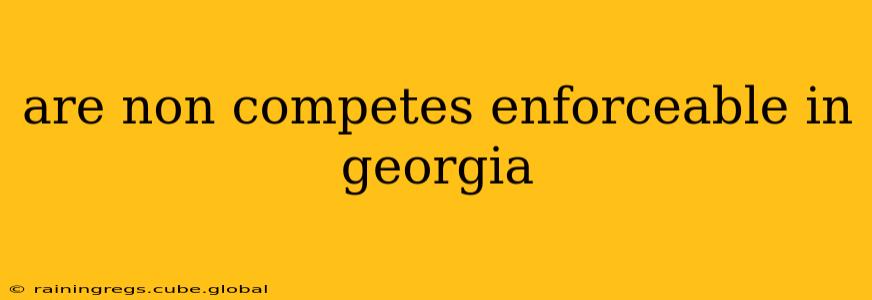Georgia law recognizes the validity of non-compete agreements, but their enforceability hinges on several crucial factors. Simply put, not all non-compete agreements are created equal, and the courts will carefully scrutinize their terms to ensure they are reasonable and protect legitimate business interests. This post will delve into the specifics of Georgia's non-compete laws, answering key questions and providing insights for both employers and employees.
What Makes a Non-Compete Agreement Enforceable in Georgia?
Georgia courts apply a "reasonableness" test to determine the enforceability of non-compete agreements. This means the agreement must be reasonable in terms of its:
- Scope: The geographic area covered by the agreement must be reasonable and related to the employer's business. A nationwide restriction for a small, locally-based business would likely be deemed unreasonable.
- Duration: The length of time the employee is restricted from competing must be reasonable. A non-compete that lasts indefinitely is unlikely to be enforceable. The duration should be proportionate to the legitimate business interests protected.
- Scope of Activities: The types of activities the employee is prohibited from engaging in should be reasonably limited to those that directly protect the employer's legitimate business interests. Overly broad restrictions that encompass unrelated businesses or activities will likely be struck down.
A non-compete agreement must also be supported by consideration. This means something of value must be exchanged between the employer and the employee. This is often the initial employment or a subsequent promotion, raise, or other benefit. The consideration must be directly linked to the non-compete agreement.
What are the Exceptions to Enforceability?
Even if a non-compete agreement seems reasonable on its face, certain exceptions may render it unenforceable. These include:
- Unconscionability: If a court finds the agreement to be shockingly unfair or one-sided, it may be deemed unconscionable and unenforceable.
- Lack of Consideration: As mentioned earlier, a non-compete needs consideration to be valid. If there's no legitimate exchange of value tied to the agreement, it won't hold up in court.
- Violation of Public Policy: A non-compete that restricts competition in a way that harms the public interest is unenforceable.
What if My Non-Compete Agreement is Unenforceable?
If a court finds a non-compete agreement to be unenforceable, it may sever the unreasonable parts of the agreement, leaving the reasonable parts intact. This is known as "blue penciling". However, if the unreasonable parts are so intertwined with the reasonable parts that separating them would fundamentally alter the agreement, the entire agreement may be deemed unenforceable.
How Long is a Non-Compete Typically Enforceable in Georgia?
There's no set timeframe for a non-compete in Georgia. The duration is determined on a case-by-case basis, considering the factors discussed above. A shorter duration is more likely to be considered reasonable than a longer one.
Can I Negotiate the Terms of a Non-Compete Agreement?
Absolutely. It's always advisable to carefully review any non-compete agreement before signing it. If you have concerns about the scope, duration, or any other terms, you have the right to negotiate them. Seeking legal counsel before signing is strongly recommended.
What Happens if I Violate a Non-Compete Agreement?
Violating a valid non-compete agreement can result in serious legal consequences. The employer can seek injunctive relief (a court order preventing you from violating the agreement), as well as monetary damages for any losses incurred due to your breach.
Are Non-Compete Agreements Common in Georgia?
Yes, non-compete agreements are relatively common in Georgia, particularly in industries with trade secrets or valuable client relationships, such as technology, healthcare, and finance.
This information is for general guidance only and does not constitute legal advice. If you have questions about a specific non-compete agreement, you should consult with an experienced Georgia attorney.
